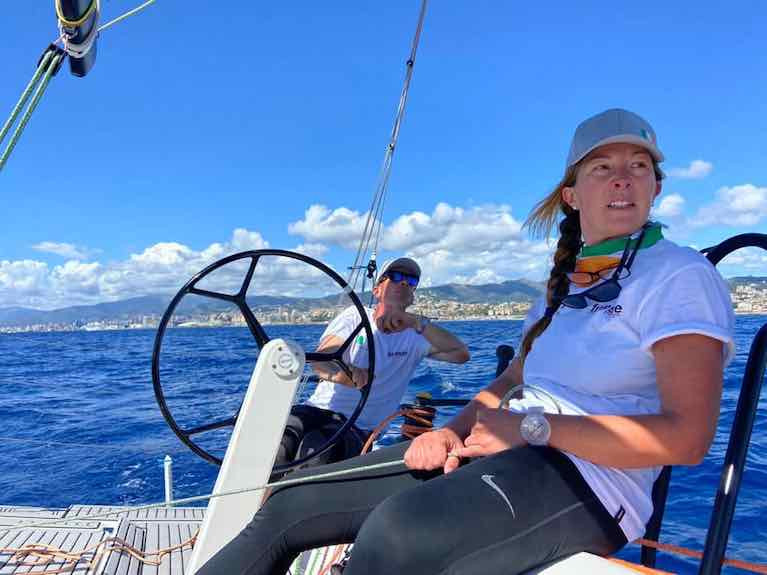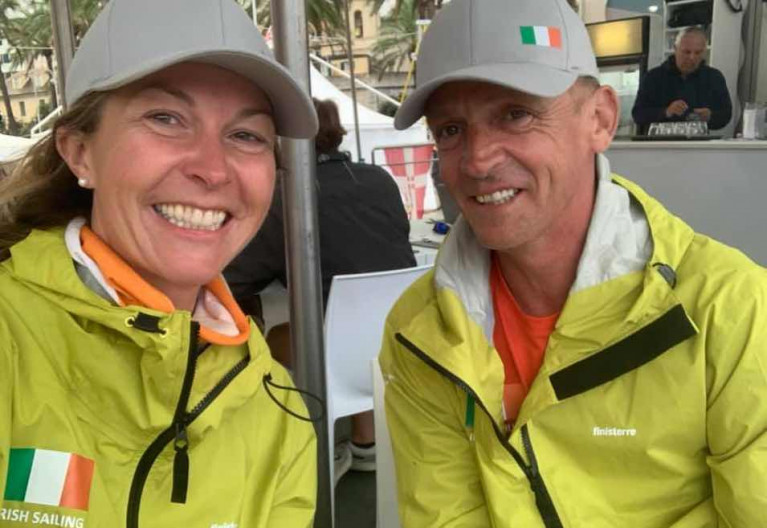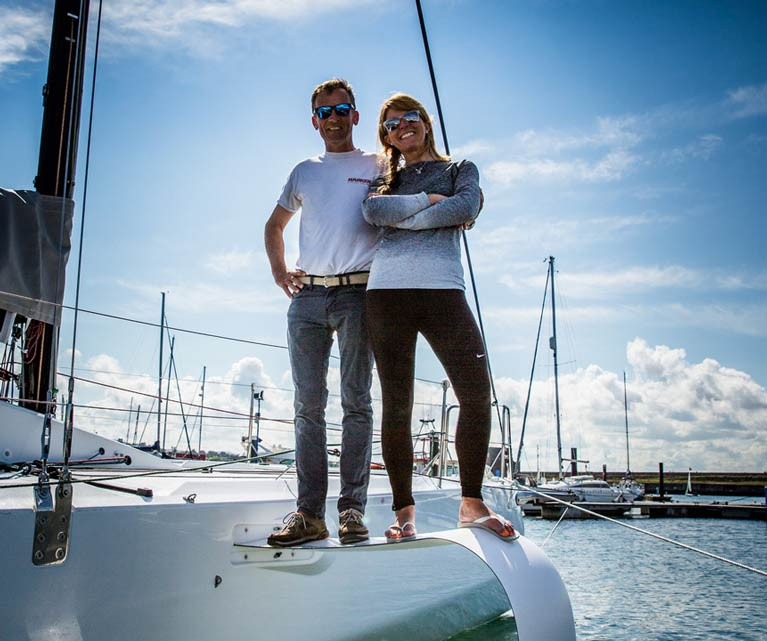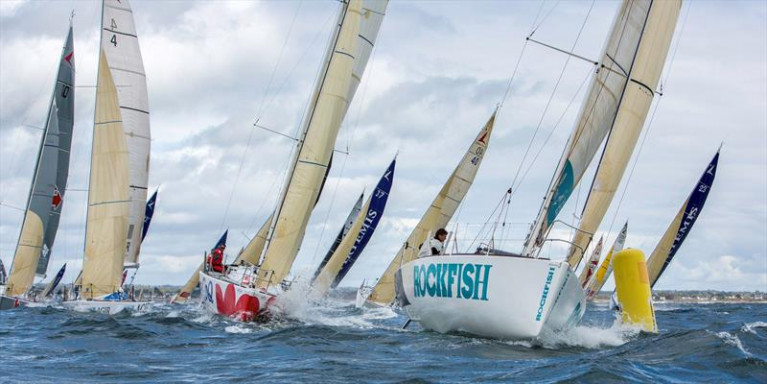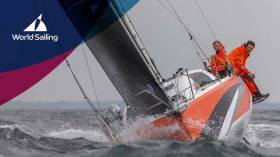Displaying items by tag: Mixed offshore keelboat
Ireland's Olympic Offshore Keelboaters Prepare as New Discipline Celebrates Rapid Growth in its First Month: 1600 Members from 66 Countries
The new Offshore Doubles organisation that aims to represent the growing interests of two-handed offshore sailing, the newest Olympic sailing discipline for Paris 2024, has announced that at the end of its first month of operation has 1,600 members from 66 countries with all six continents well-represented.
In a recent update. the new group say the Olympic Event of Mixed Offshore Doubles is a pinnacle event of the sailing discipline and it was proposed and ratified as the Olympic slate by World Sailing at the Annual Conference in Sarasota in 2018 and sent to the International Olympic Committee (IOC) in 2019.
As Afloat previously reported, over the next month, the IOC is expected to make their final decisions on the slates proposed by all sports.
Four Irish Mixed Keelboat Campaigns?
As far as Ireland is concerned, there is significant interest with currently up to three (or maybe four) possible contenders for the single berth including top solo offshore skipper Tom Dolan (pictured above) who, quite significantly, finished fifth overall at this year's La Solitaire du Figaro, Ireland's best-ever result. Dolan claimed in March that he intends to recruit a female co-skipper for an Olympic bid but there is so far no word from the Dolan camp of a sailing partner.
The Dun Laoghaire and Greystones partnership of Kenny Rumball and Pamela Lee has also thrown their hat in the ring for Paris 2024 and last month Lee set a Round Ireland doubles speed record with Cat Hunt in the Figaro 3 boat.
 Kenny Rumball and Pamela Lee
Kenny Rumball and Pamela Lee
Howth's Conor Fogerty, a former Afloat Irish Sailor of the Year, has teamed up with Susan Glenny and this year the duo competed in the Eurosaf Mixed Keelboat European championships in Italy, a race that Fogerty described as challenging here.
 Susan Glenny and Conor Fogerty
Susan Glenny and Conor Fogerty
The cost of staging the Olympic Event of Mixed Offshore Doubles
There have been some reported questions about security and cost of the Paris 2024 Olympic event. The security question has been solved by the French Navy's assurance that they will provide security on the course. The operating costs of the event have been reviewed by the World Sailing and will be significantly lower than other sailing events because the Offshore Mixed Doubles Event is one race with a single start and finish. Other than the final short leg, all protests will be heard electronically using the 24/7 media and tracking during the event. Penalties will be assessed and taken before the last short leg to the finish and first boat across the finish line first wins.
In discussion with many of the teams, even from many smaller countries, the cost of the boat is not the big issue some claim. The boats in the event will be supplied without additional cost to competitors and the boats used for training can be any boat of appropriate size and configuration.
More on this from the offshore doubles organisation here.
Just when proponents of Offshore Mixed Doubles sailing should be celebrating new Olympic status, the champagne is on ice this week as World Sailing debates a submission that it should not proceed with changes it agreed last year due to the fact that COVID-19 has turned the world upside down.
A submission at World Sailing's virtual annual conference from the Hungarian Sailing Federation, Korean Sailing Federation, Serbian Sailing Association and the International RS:X Class Association is asking to retain the 2020 Olympic Events and Equipment for the 2024 Olympic Sailing Competition, a decision that if taken would not include the new keelboat choice.
It has led the offshore doubles association to ask sailors to join up to the newly formed association to demonstrate support for the event so it can continue to be on the slate for Paris 2024. "We need to show the Olympic committee that Doubles has broad global support," a doubles spokesman said.
If the new class can successfully overcome this submission, then, as regular Afloat readers will know, the final hurdle would appear to be a meeting of the International Olympic Committee (IOC) itself that sits in December to have the final say on Offshore Mixed Doubles for Paris 2024.
IOC Decision on Olympic Mixed Offshore Keelboat for Paris 2024 to be Made in December
Confirmation that the mixed double-handed Olympic keelboat will be on the slate for Paris 2024 will be decided by the International Olympic Committee (IOC)’s Executive Board (EB) when it sits to confirm the event programme and athlete quotas in December.
There is Irish interest in the mixed offshore keelboat class nominated by World Sailing for Paris. Three teams have declared an Interest with Ireland competing in the EUROSAF Mixed Offshore keelboat European Championships.
A confident World Sailing insider told Afloat the hope is that the debut keelboat class will be granted an 18-boat fleet, aided by the fact that the 2024 Olympics is in France, where the sport of sailing is a big draw.
Of course, it will be a busy agenda for December's meeting with the new Olympic sailing class just one item on an agenda that sees decisions made on requests from 20 of the 27 Olympic International Federations for changes to the Paris 2024 event programme.
Four additional sports are also proposed by the Organising Committee.
The IOC says decisions will be based on the recommendation of the Olympic Programme Commission (OPC) after receiving feedback from the athletes, International Sports Federations (IFs), National Olympic Committees (NOCs) and Paris 2024.
The IOC EB underlined that the decisions should be based on the following previously established key principles:
- Reducing the overall athlete quota (including for all new sports) to 10,500;
- Achieving gender-equal participation across the Olympic Games at the event and discipline level where possible;
- Prioritising new events that accommodate athletes within the sport’s existing quota allocation; and
- New events only if there are existing venues.
“The exceptional situation caused by COVID-19 requires exceptional measures. Therefore, any decision concerning the event programme for Paris 2024 should reflect the Olympic Agenda 2020, including a new phase of the ‘New Norm’. The IOC EB has reiterated the vital importance of reducing the cost and complexity of hosting the Olympic Games, particularly concerning venue requirements,” said IOC President Thomas Bach. “For the event programme, we have maintained the December 2020 deadline, even though new sports can now not be tested on the Olympic stage, but we need to give certainty to the concerned athletes, their NOCs and Federations and the Organising Committee.
French Claim European Mixed Offshore Title as Ireland's Fogerty & Glenny Make L30 Debut
France has claimed the inaugural European Mixed Offshore Title in Italy in which Ireland's Conor Fogerty and Susan Glenny made their debut in the L30 keelboat but unfortunately did not finish the one race event.
Fogerty says he is still 'licking his wounds' after the top-level event, claiming that 'only three hours sail time on the boat before the main event wasn't ideal'.
"We had issues onboard which augmented under pressure. I would have at least expected a fifth or sixth, but we were set on finding big holes in a light breeze", the Howth sailor related to Afloat.
 Conor Fogerty and Susan Glenny - the Irish pair say it was an amazing learning experience in a brand new boat and on a colourful race track that presented all of the favourite wind shut downs, complex currents and Mediterranean thermal affects
Conor Fogerty and Susan Glenny - the Irish pair say it was an amazing learning experience in a brand new boat and on a colourful race track that presented all of the favourite wind shut downs, complex currents and Mediterranean thermal affects
In the end, the race was a close and long duel between French team Benjamin Schwartz and Marie Riou against Íker Martínez & Natalia Via-Dufresne (ESP) with the French finally on top. "It was a hard and complicated race where we made some risky choices that turned out to be some bad ones and some good ones", so the first feedback of Benjamin Schwartz. The French took the lead from the Spanish team during the last night with a risky decision to sail away from the leading boat and the rest of the fleet. "In the morning we found ourselves at the top of the fleet from where we controlled the race for the last few miles back to Genoa“, explained Marie Riou.
Surprisingly, it wasn’t the Spanish team to cross the finishing line on second place after leading for many many hours. It was up to the Belgians Jonas Gerckens and Sophie Faguet to claim silver around 80 minutes after the French gold medalists. Third and with a slight bitter taste in their mouths, the Spanish Martínez/Via-Dufresne cut the line at 10:52 a.m., returning from a remarkable performance as they maintained the lead of the race until just a few hours before the finish and dictated the pace to the entire fleet for almost the entire course of the race. Just a few minutes after the Iberian crew, the national team Claudia Rossi and Matteo Mason finished a long race in pursuit of the first three. They tried and never gave up by sailing an excellent race, especially since they were making their debut on the L30.
 L30 Mixed Offshore European Entry List
L30 Mixed Offshore European Entry List
What's the L30 like offshore?
Fogerty says from his brief experience the L30 is an 'interesting concept, twin wheels, lifting rudders and keel, not to mention a possible configuration of Gennaker, J1, J3 and main all flying at the same time......'
 Fogerty & Glenny have expressed a hope to represent Ireland in the new mixed offshore keelboat class that will have its inaugural year as an Olympic class at the Paris 2024 Olympics
Fogerty & Glenny have expressed a hope to represent Ireland in the new mixed offshore keelboat class that will have its inaugural year as an Olympic class at the Paris 2024 Olympics
The former Ostar winner says he has some misgivings with the L30 as an offshore boat, "Any one design is going to be fun, and the L30 ticks that box, but Offshore? Shorthanded? It's too busy for a 30-ft and not set up for shorthanded racing, the twin wheel configuration cuts you off from the tools to trim your sails, even the autopilot is 10ft away on the coach roof. I also wouldn't be happy in a big breeze, due all those retractable underwater foils"
 The L30 - a fun boat
The L30 - a fun boat
He adds "It's a fun boat, lots of sail, but needs a crew and I think they should stay coastal and leave Offshore to tried and tested methods of offshore boats".
Just how strong the teams were at the event is shown by the fact that even the seventh team crossed the finish line within four hours of the winners; only one team didn’t finish.
- Team FRA 65h 46min 37sec
- Team BEL +1h 19min 19sec
- Team ESP +1h 31min 39sec
- Team ITA +1h 41min 47sec
- Team GER +2h 28min 31sec
- Team NED +2h 39min 36sec
- Team GBR +4h 09min 49sec
- Team IRL DNF
- Team MON DNS
For Ireland's Conor Fogerty and Susan Glenny, this month's EUROSAF Mixed Offshore European Championship in Italy is an opportunity to get racing following the cancellation of the Round Ireland Race and to evaluate their programme at an early stage.
The introduction of offshore sailing into the 2024 Olympic Games is attracting some "old dogs" to Olympic competition. Two-time gold medallist Shirley Robertson (GBR) is pondering a campaign with Henry Bomby, who with Hannah Diamond was first in the mixed double-handed class in the 2019 Fastnet.
Ken Read (USA), nine times a world champion in one-designs and a two-time Volvo Ocean race skipper, has been campaigning a Jeanneau Sunfast 3300 in the two-handed mixed event in the US. The entry list for the upcoming EUROSAF Mixed Offshore European Championship contains quite a few Olympic veterans.
 EUROSAF Mixed Offshore European Championship Entry List
EUROSAF Mixed Offshore European Championship Entry List
Marie Riou (FRA) 2012 Olympics in the Elliott 6m, Natalia via Dufresne (ESP) is a two-time silver medallist (1992 Europe, 2004 470), Iker Martinez (ESP) has a gold from Athens and a silver from Beijing in the 49er, Annamieke Bes (NED) won silver in the Yngling in Beijing.
The EUROSAF event, the second of its type, is missing defending champions Austria, but last year's runners up - 2 - Sophie Faguet and Jonas Gerckens (BEL) are in the field.
Once again, racing will take place in supplied L30 one-designs and there is one race in the final series (depending on numbers there may be an 8-10 hour coastal race qualifier). The plan is for a two-night race of about 45 hours duration.
The event is clearly aimed at emulating the Olympic format and may provide some early indicators fo form for 2024.
Note: Watch the performance of Sunfast 3300 Cinnamon Girl in the Fastnet 450 this weekend - this boat is one of the favourites to be selected as the 2024 Olympic Offshore class.
Can Irish Mixed Offshore Trial Cancellation Lead to New Plan for Paris 2024 Olympics?
Every cloud has a silver lining and perhaps for Irish Sailing, it has come with the cancellation of the trials series scheduled in Concarneau for the World Offshore Sailing Championships this week.
Its cancellation notice, however, was notably the first Irish Sailing update on these trials. The three trialists have yet to be published. In fact, every aspect of the trials has been conducted privately between a small number of sailors and the Irish Sailing office.
Back in December, as news of the 2024 Olympic class was announced, Irish Sailing said 'while it will facilitate the process for the selection of a team, it should be noted from the outset, that Irish Sailing has no budget for this event and all costs will be borne directly by the teams competing'.
Irish Sailing has done well to maximise the investment in its High-Performance programme to date. Accounts show a total of over €3m on funding between 2017 and 2020. Now that Offshore sailing has a place in the Olympics, it must be included in the planned investment for the next cycle. Offshore is a discipline with which we are familiar and unlike most of the Olympic classes, forms a significant part of our national sailing scene. We are not without talent, and the opportunity, especially in a one boat per nation event, must be matched with the available resources to develop a strong development programme with Paris 2024 in mind.
Hopefully, March's cancellation will encourage Irish Sailing to review the way in which this opportunity has been handled, perhaps learning from the open and transparent way, for example, the RYA has conducted its offshore trial.
When World Sailing decided to include Offshore Sailing in the Olympic Games, Irish sailors were delighted to see an opportunity for easier access to the pinnacle sports event in an area where Ireland has displayed some strength.
At that time, imaginations overflowed about how this could impact positively on the development of sailing, with a particular shift towards female participation.
In the Sport Ireland commissioned Rio 2016 review, it was recommended the sport could benefit from 'more class competition within Ireland'. Other than the Laser dinghy, there is no domestic competition in Olympic classes here. This new keelboat is an opportunity to make Olympic sailing more visible and part of the national sailing scene where more than 70% of all racing is now in keelboat classes. What's more, it's a chance for Irish Sailing to deliver on the 2016 recommendation.
Qualification for the Worlds, a precursor to any Olympic campaign, could be in boats that already exist, at events that already exist, using a rating system, without the huge costs associated with Olympic campaigning. Double-handed male/female elements could be added to ISORA, Round Ireland, Dun Laoghaire-Dingle and similar events, enhancing those, encouraging participation and providing ready-made training opportunities.
The hopes for this were dashed when Irish Sailing, in a private communication to a few who had declared interest, decided the trials for the Offshore Worlds were to be run in Figaro style boats which effectively had to be chartered at a cost of €5,000.
Furthermore, the trials were to take place in France in late March/early April.
Rearrangements for these trials currently underway brings with it the chance for Irish Sailing to be encouraged to establish appropriate, transparent and public procedures for future selection events.
Ultimately, this will mean the winner gets the honour of representing Ireland on the world stage in the knowledge that they have been the best of the Irish in an offshore trial that followed best practice and as a result Irish Olympic sailing moves centre stage on home waters.
Irish Sailing Seek Expressions of Interest for Offshore World Sailing Championships 2020
World Sailing has recently announced the criteria for selecting teams for the Offshore World Sailing Championships scheduled to be held in Malta from 10 – 22 October 2020. This is a newly established event for a double-handed mixed crew.
There are a maximum of 20 entries for the World Championships, and if there are more than 20 countries seeking an entry, a qualifying series will be held in Western Europe sometime during the period 1 May – 30 June 2020 to establish the European entries into the event.
MNAs (Member National Authorities) are responsible for selecting and entering the team to represent them at the 2020 Offshore World Championships. Irish Sailing has submitted a request to World Sailing for entry to a qualification event, to allow for an Irish Team to be represented.
Irish Sailing would like to hear from anyone who is interested in entering a team into the event. Please note in particular the Athlete Qualification Event Requirements under section 5 of the attached notice. While Irish Sailing is very supportive of, and will facilitate the process for the selection of a team, it should be noted from the outset, that Irish Sailing has no budget for this event and all costs will be borne directly by the teams competing.
Once we have an indication of the level of interest, we will establish a process for the selection of a team to represent Ireland.
Please submit your expression of interest before 5th January 2020 to [email protected] stating the names of your team members (one male, one female) and a brief CV of experience.
You can read the World Sailing Information Document below




























